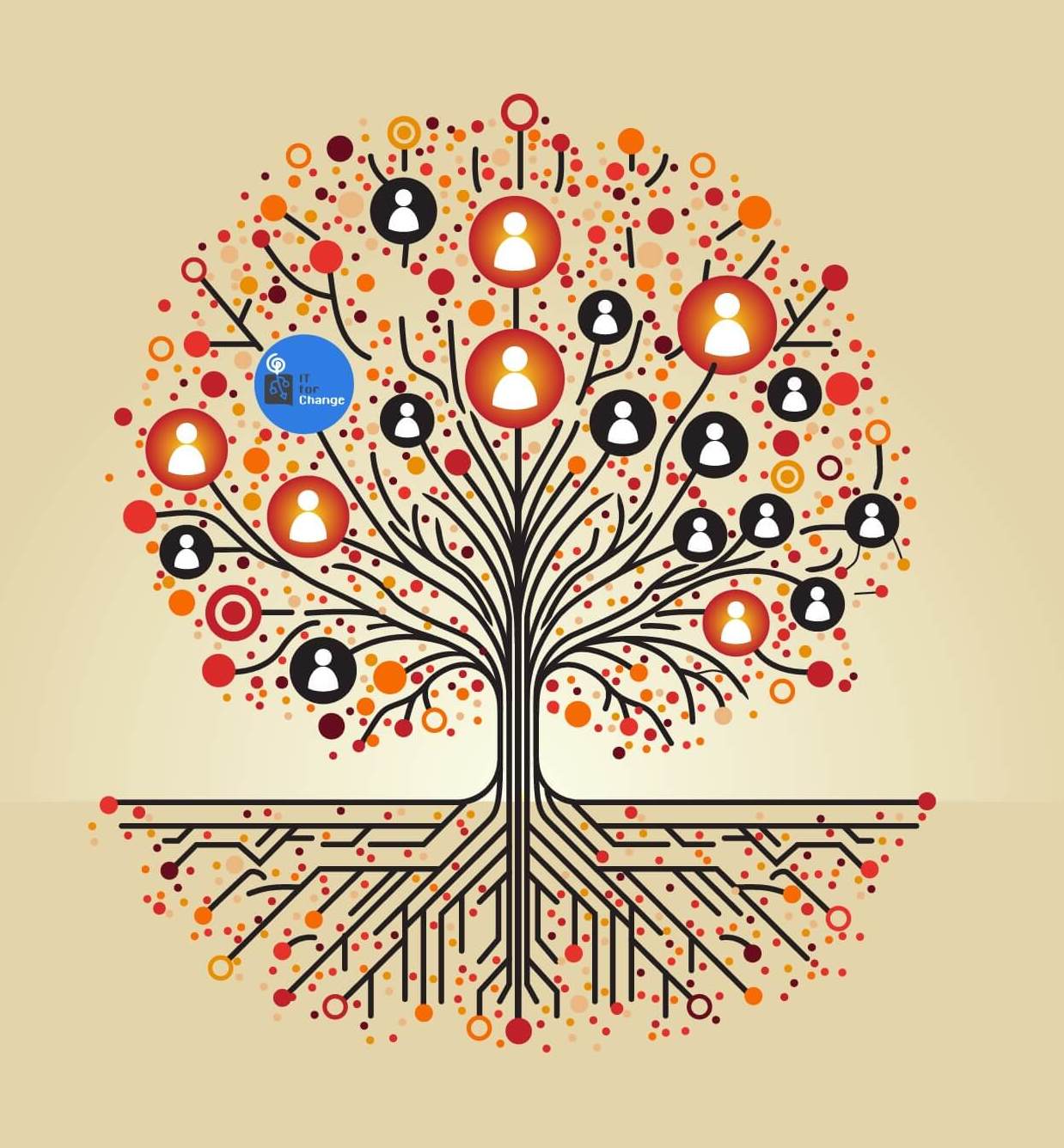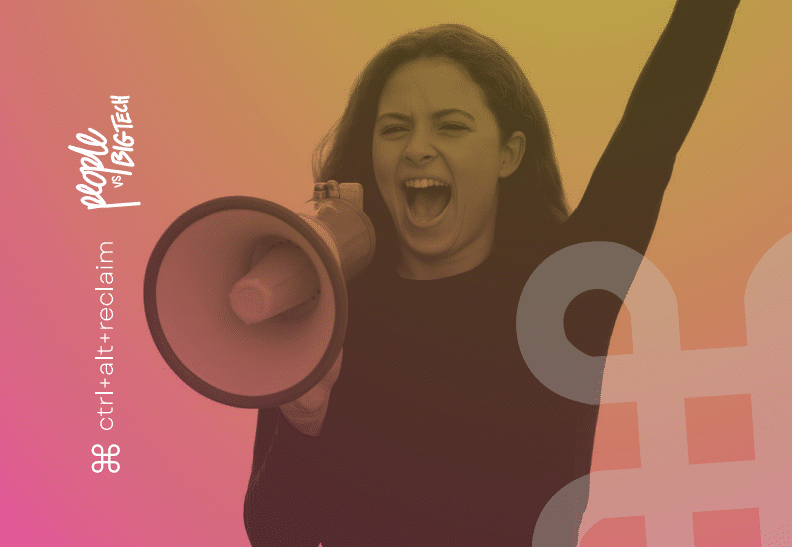Beyond Big Tech: A manifesto for a new digital economy
70+ orgs back bold vision for a better, fairer digital world and call on states to invest for the public good

We, people and organizations from across the globe, are fighting for a future where the digital infrastructure underpinning our world works for people, workers, and the planet. And where creativity and innovation can flourish free from centralized control.
We believe in a world where power over data and technology is decentralized, redistributed and democratized, instead of being held by harmful tech monopolies. Where people can choose between a wide variety of digital tools to explore and connect, without giving up their privacy and other rights. Where we really get to control and trust what we see on our social media feeds, instead of algorithms designed to surveil, exploit, enrage, and addict.
It’s a world we know is possible, necessary and urgent. But it won’t come about by chance. Creating the digital future we all deserve will take a determined ‘whole of government’ effort from states – to break up the powerful tech monopolies, steer the digital economy in a direction that promotes innovation, fair competition, and democratic values, and offer people genuine freedom and choice in goods and services that are designed to serve them, rather than use and abuse them.
Big Tech corporations have locked us into a narrow and warped version of the digital world that chips away at our democracies and concentrates wealth, while deepening global inequalities. We must break down Big Tech’s walled gardens, which protect their profit margins, not the public interest. Doing so will unleash progress, fair competition and innovation in a new digital economy – one built to serve the billions of lives the Internet is weaved from, not the tiny group that currently holds the strings. Doing so will require states to:
1) Break Open Big Tech to level the playing field
To create the conditions for a new digital economy, regulators must target the structural power of the tech giants and level the playing field so alternatives can emerge and scale. This includes:
- Break up dominant tech firms through stronger enforcement of competition and antitrust law and regulation to enforce structural separations, and prevent further consolidation by blocking more mergers and acquisitions.
- Require dominant tech firms to be more interoperable to enable users to freely choose and move between different platforms and services, open up new entrants to the market, and make platform recommendation systems customizable for users.
- Tax dominant tech firms to redistribute the enormous profits they currently extract as rents, including through digital services taxes.
2) Stimulate a new and fair digital economy
States’ industrial policies and strategies must proactively foster a more open and diverse ecosystem of digital services that serves public goals and not just private profit. This includes:
- Commit significant investment towards public digital infrastructure based on free and open source software and the digital commons.
- Use public procurement as a market lever to encourage the adoption and scaling of open and interoperable alternatives to the Big Tech incumbents.
- Put in place and enforce strong human rights safeguards and accountable governance frameworks, including over public digital infrastructure.
The digital world is our world; its tools are the infrastructure of human connection. It is too vast and important to leave in the hands of a tiny, self-interested few. By using these levers, states can move beyond efforts to simply mitigate the symptoms of Big Tech’s concentrated power and harmful business models and allow a better and fairer digital economy to emerge. We urge them to begin now.
Signed,
Robin Berjon, Governance & Standards Technologist
Dr. Ian Brown, Centre for Technology and Society at Fundação Getulio Vargas (FGV)
Dr. Christina J. Colclough, The Why Not Lab
Dr. Maria Farrell, Writer
Michelle Meagher, Competition lawyer and author
Accountable Tech
African Internet Rights Alliance
AfroLeadership
AI Forensics
AlgorithmWatch
Alternatif Bilisim (AiA-Alternative Informatics Association)
Alliance4Europe
ARTICLE 19
Associação Alternativa Terrazul
Association for Progressive Communications
Attac Norway
Balanced Economy Project
Bangladesh NGOs Network for Radio and Communications
Bürgerbewegung Finanzwende e.V.
Canadian Anti-Monopoly Project (CAMP)
Center for the Study of Organized Hate
Centre for Artificial Intelligence Ethics and Governance in Africa (CAIEGA)
Centre for Internet and Society, India
Check My Ads Institute
Coding Rights
Commons Network
Conectas Direitos Humanos
Consortium of Ethiopian Human Rights Organizations
Corporate Europe Observatory (CEO)
Council for Responsible Social Media
CyberLove
D64 - Zentrum für Digitalen Fortschritt
Data & Society
Defend Democracy
Digital Action
digiQ
Digitalcourage
Ekō
European Digital Rights (EDRi)
Fair Vote UK
Federación de Consumidores y Usuarios CECU
Forum on Information and Democracy
Foxglove
German NGO Forum on Environment & Development
Global Action Plan
GRESEA
Hindus for Human Rights
Homo Digitalis
Human Rights Journalists Network Nigeria
HuMENA for Human Rights and Civic Engagement
IT 4 CHange
Lie Detectors
LobbyControl e.V.
LODelle
Media Matters for Democracy
Nexus Research Cooperative
Open Future
Open Knowledge Foundation
Open MIC
Open Markets Institute
Open Rights Group
Panoptykon Foundation
People Vs Big Tech
PLZ Cooperative
Public Citizen
Rebalance Now
SHARE Foundation
SocialTIC
SOMO
Superbloom Design
TEDIC
Tehila
The Citizens
The London Story
Transnational Institute
UBUNTEAM
Universität zu Köln
Uplift
Waag Futurelab
WACC
Wikimedia Germany
T20 Working Group on Information Integrity, Interoperability & Media Diversity (i3M)
VoxPublic
World Economy, Ecology & Development - WEED
Xnet, Institute for Democratic Digitalisation




